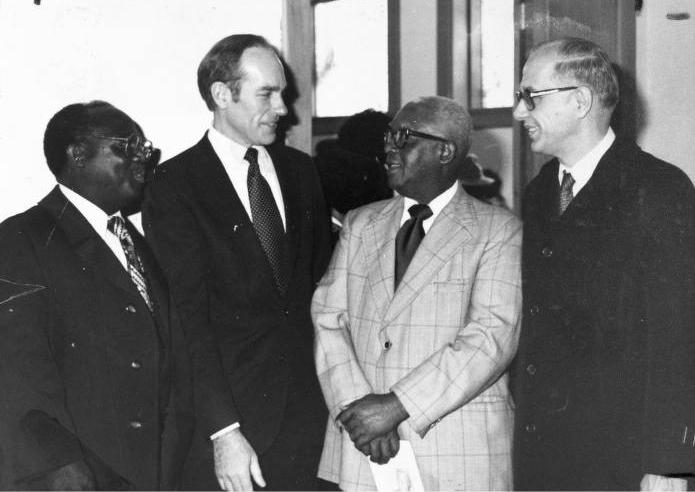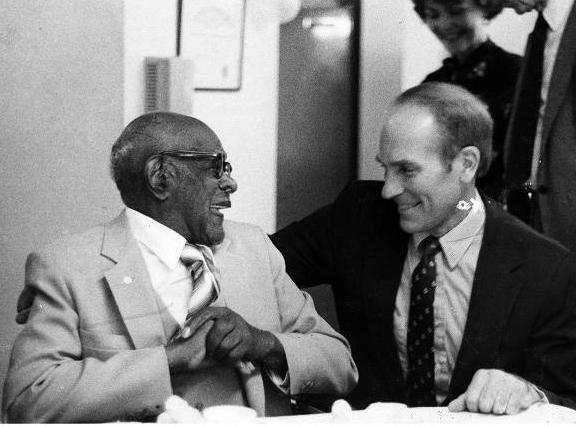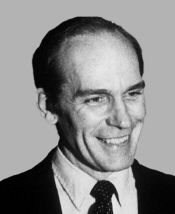(Feb. 24, 1932 – Dec. 28, 2013). Known for his social liberalism and fiscal hawkish positions, Andrew Jacobs Jr., an Indiana Democrat, served for 30 years as a member of the United States House of Representatives, beginning in 1960. While serving under seven presidents Jacobs’ willingness to compromise earned him a reputation as a true bipartisan—a social liberal and a fiscal hawk.
Jacobs was born in Indianapolis, son of a judge and one-term member of the House of Representatives, Graduating from in 1949, Jacobs Jr. joined the U.S. Marines as an infantryman to serve in the Korean War where he sustained disabling injuries. He earned his business and law degrees from Indiana University in 1955 and 1958, respectively. Jacobs served as a sheriff and practiced law before he served in the Indiana House of Representatives from 1959 to 1960.
Though he lost his first campaign for Congress in 1962, in 1964 a landslide nationawide victory for the carried Jacobs to the U.S. House of Representatives for the 11th Congressional District, which covered most of the southern portion of Marion County. In Congress, Jacobs served on the House Judiciary Committee where he coauthored the Voting Rights Act of 1965. He was active in the American Civil Rights Movement during the 1950s and 1960s.

Jacobs openly criticized the U.S. involvement in the Vietnam War. In the House, he led an all-night debate to demonstrate his opposition to the U.S. military incursion in Vietnam. Jacobs coined the terms “war wimp” and “chicken hawk” in the 1960s to describe a politician with a hawkish war position who deliberately avoided military service earlier in life.
With 40 House members and a half-dozen senators, Jacobs led legislation to allow citizens to opt-out of federal taxes earmarked for the military. Although the Religious Freedom Peace Tax Fund Act never made it out of committee, it signaled Jacobs’ strong pacifist leanings.
In 1972, Jacobs faced future Indianapolis Mayor in a competition for an Indiana Congressional seat. Hudnut won that challenge, but Jacobs regained his House seat in the 1974 Democratic landslide. Jacobs served on the House Ways and Means Committee from 1974 until he retired from Congress in 1997. He was known to refer to the committee as the “Mean Ways Committee” because many of the bills passed hurt those on society’s margins. He advocated providing public financing for election, a balanced federal budget, voting rights, and civil rights, eliminating tax breaks and loopholes, and opposing costly or pointless wars.
Jacobs worked with Golden Rule CEO to make healthcare more affordable based on tax fairness. In a bipartisan effort, Jacobs and Republican Congressman from Texas Bill Archer helped to lead the 1996 enactment of the Health Insurance Portability Act, which allows subscribers to earn federal tax credits for its use.

Oftentimes derided as a penny-pincher, Jacobs strongly favored fiscal accountability. He maintained a persistent voting record against governmental waste, fraud, and corruption. To prove his point, he never accepted speaking fees, took no junkets, refused House stamping privileges, refused PAC money, and rarely used elevators to save electricity. He would not accept his veterans’ disability check and turned down his congressional pay raises. He even declined a color television the House media center offered him, joking, “I know of no good reason for viewing [House Speaker] Tip O’Neill in living color.”
Jacobs also served as the Chairman of the Subcommittee on Social Security. In the 1980s, he introduced legislation and reforms that resulted in making Social Security an independent government organization. Jacobs retired from Congress in 1997 with a reputation as a bipartisan politician willing to compromise with his peers.
Jacobs endorsed as his replacement. Jacobs had hired Carson as his legal assistant in 1965, a position she held for seven years until he coerced her to run for office. She served until her death in 2007.
Jacobs taught political science at following his retirement. He authored two critiques of American militarism and regularly contributed to Magazine in Indianapolis. He described U.S. wars as “unconstitutional pseudo-macho presidential wars” in his 1999 book, The 1600 Killers: A wake-Up Call for Congress, Jacobs’ critiques of U.S. military incursions extended to America’s involvements in Iraq and Afghanistan in the 2000s.
So often labeled a cheapskate, Jacobs credited his thrift with saving his life. In 1974, he tried to book a flight from Washington to Indianapolis but the only seat available, a first-class ticket, cost $20 more than a seat in coach. Jacobs refused to book the seat even though it was on the government’s tab. He booked a seat in coach on the next flight out. The flight he would have been on crashed, killing all 92 aboard including one of his staff members. Jacobs remarked that he saved the U.S. Treasury $20 and the Treasury saved him.

Help improve this entry
Contribute information, offer corrections, suggest images.
You can also recommend new entries related to this topic.





